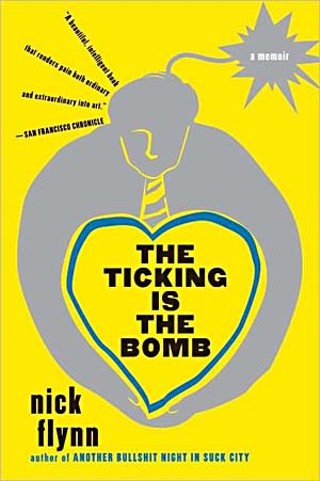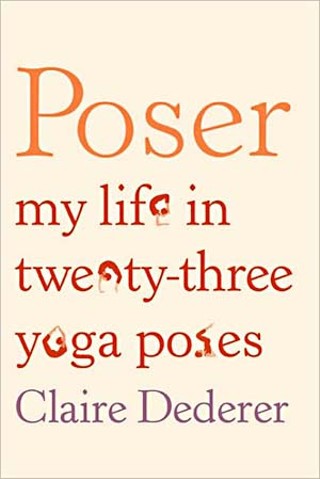Poser: My Life in 23 Yoga Poses
Two memoirs explore new parenthood and old childhoods with still-open wounds
Reviewed by Kimberley Jones, Fri., Feb. 18, 2011

Poser: My Life in 23 Yoga Poses
by Claire DedererFarrar, Straus and Giroux, 352 pp., $26
The Ticking Is the Bomb
by Nick FlynnW.W. Norton & Company, 283 pp., $14.95 (paper)
If you are childless but keep company with doting parents, you probably know the Pavlovian flinch that comes with that conversation starter, "My kid just did the cutest thing." The prospect of a book-length accounting of new parenthood is enough to egg a flinch on to full-body shudder, but memoirists Claire Dederer and Nick Flynn smartly refract their parenting observations through other (very different) prisms: yoga and state-sanctioned torture.
Despite its title and framing device (Dederer uses a different pose, from Camel to Crow to Pranayama, as each chapter's entrée), Poser covers far more ground than simply the author's deepening devotion to yoga. Dederer, a Seattle-based journalist, wields a ruthless wit to describe the eternal adolescence of her generation and the religiosity with which that generation, when it finally gave up the ghost, fell upon attachment parenting. An admitted perfectionist, she tries to keep up with the city's hipster-precisionist parents on an erratic income (she and her husband are both freelance writers) and with frightfully little alone time: The yoga, at first, is a means to carve out some quiet, a sweaty hour to herself.

Running sidelong to her yoga exploration is an examination of her parents' amicable but still devastating split when she was a child, when her mother fell in love with a hippie 15 years her junior and her discarded father retreated to a boathouse. Unraveling and understanding the boldness of her mother's action – its spot in the landmarking of feminism – becomes crucial to Dederer's still-developing picture of herself. She skillfully and sympathetically articulates how women her age are bewildered in the their attempts at self-definition, so entirely removed their timelines are from their mothers': "In twenty years, the span between my mother's youth and my own, the norm of early marriage was subverted and puffed away, like a dandelion clock, as if it had never existed."
Dederer can be quite brutally funny, even as the reader breathes a sigh of relief not to be in her near orbit, under her unforgiving gaze (she describes a best friend's husband as "too-cool-for-school" and unapologetically catalogs another friend's extramarital affair and her own husband's chronic depression). There are verbal tics that occasionally grate (her toddler daughter's pudginess is hyperaccented, which may be explained by Dederer's own recollections of an overweight childhood), and the book's end-epiphanies, while hard-fought, whiff of an "I'm okay; you're okay" self-help arc, neatly ribboned and pretty much foregone. But mostly the book – buoyed by Dederer's chatty mien, her unshowy yet lyrical phrasing, her willingness to chew the raw spots till she reaches some relief – is a magnetic read.
Nick Flynn is not chatty. His chapters come in terse bursts – they typically stretch only a page or two – and his revelations aren't just raw; they're practically oozing with infection. Flynn, who reads next week at Texas State University, detailed a rocky relationship with his vagabond father in 2004's Another Bullshit Night in Suck City. Dad figures in this follow-up, too (a fuzzy-headed hoarder, he faces eviction), but it's Flynn's mother who comes to the fore here, as he approaches the same age at which she committed suicide.
Temporally jagged but very rarely anything less than electrifying, The Ticking Is the Bomb trips from remembrances of an unstable, peripatetic childhood and the adult seesaw between two lovers to Flynn's impending fatherhood and open-mouthed horror at the Abu Ghraib atrocity. It's a heady mix, with high-low cultural touchstones that spread-eagle a Piero della Francesca fresco and zombie films, and at first, the shared space of torture and new-dad nervousness seems like an almost comically bad idea.
But with his poet's ear for rhythm and call-back, Flynn settles into the story with the confusion and cool rage of his troubled youth, carried over into his troubled middle age, informing his reaction to Abu Ghraib. It might even explain his fervor, how he is galvanized beyond the casual, sofa-seat revulsion of most Americans to travel to Istanbul, Turkey, to witness torture survivors' testimonials and then revive, in harrowing detail, a woeful chapter in national history that most of us would prefer to forget.
Nick Flynn will read at Texas State University's The Wittliff Collections (Alkek Library, 7th floor) on Thursday, Feb. 24, 3:30pm, and the Katherine Anne Porter Literary Center (505 Center St., Kyle) on Friday, Feb. 25, at 7:30pm.














